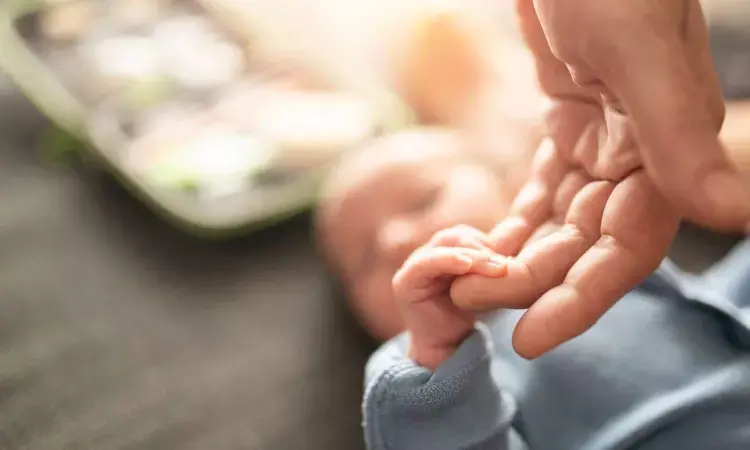- Home
- Medical news & Guidelines
- Anesthesiology
- Cardiology and CTVS
- Critical Care
- Dentistry
- Dermatology
- Diabetes and Endocrinology
- ENT
- Gastroenterology
- Medicine
- Nephrology
- Neurology
- Obstretics-Gynaecology
- Oncology
- Ophthalmology
- Orthopaedics
- Pediatrics-Neonatology
- Psychiatry
- Pulmonology
- Radiology
- Surgery
- Urology
- Laboratory Medicine
- Diet
- Nursing
- Paramedical
- Physiotherapy
- Health news
- Fact Check
- Bone Health Fact Check
- Brain Health Fact Check
- Cancer Related Fact Check
- Child Care Fact Check
- Dental and oral health fact check
- Diabetes and metabolic health fact check
- Diet and Nutrition Fact Check
- Eye and ENT Care Fact Check
- Fitness fact check
- Gut health fact check
- Heart health fact check
- Kidney health fact check
- Medical education fact check
- Men's health fact check
- Respiratory fact check
- Skin and hair care fact check
- Vaccine and Immunization fact check
- Women's health fact check
- AYUSH
- State News
- Andaman and Nicobar Islands
- Andhra Pradesh
- Arunachal Pradesh
- Assam
- Bihar
- Chandigarh
- Chattisgarh
- Dadra and Nagar Haveli
- Daman and Diu
- Delhi
- Goa
- Gujarat
- Haryana
- Himachal Pradesh
- Jammu & Kashmir
- Jharkhand
- Karnataka
- Kerala
- Ladakh
- Lakshadweep
- Madhya Pradesh
- Maharashtra
- Manipur
- Meghalaya
- Mizoram
- Nagaland
- Odisha
- Puducherry
- Punjab
- Rajasthan
- Sikkim
- Tamil Nadu
- Telangana
- Tripura
- Uttar Pradesh
- Uttrakhand
- West Bengal
- Medical Education
- Industry
Nose swabs may predict longer intensive care among babies suffering from RSV bronchiolitis

When a child with RSV requires intensive care, parents often ask about how long it will take before their child can go home. Currently, there is no reliable way to answer this question. Results of a new study from Ann & Robert H. Lurie Children's Hospital of Chicago, however, offer important insights.
Researchers used nose swabs from children with RSV in the pediatric intensive care unit (PICU) within a few days of hospital stay to examine what genes turn on in response to the virus. They found that despite the same quantity of RSV and the same clinical presentation, some children had signs of greater damage to the cells lining the nose, and this correlated to longer PICU stays.
Results were published in the journal Frontiers in Immunology.
"We were excited to find that the severity of a child's illness related to the different sets of genes turned on in their body's response to RSV," said senior author Bria Coates, MD, Critical Care physician at Lurie Children's and Assistant Professor of Pediatrics at Northwestern University Feinberg School of Medicine. "The ability to identify which infants with RSV in intensive care will recover quickly and which patients will require a longer stay would provide invaluable information to parents and medical providers."
Dr. Coates cautioned that these findings would need to be validated in a larger group of children before they could be used clinically. If the results hold true in larger studies, then a PCR test could be developed to distinguish the children who would likely take longer to recover from critical RSV illness.
"At this stage, we saw that more injury in the nasal mucosal membranes of children with RSV may be a marker of a dysregulated response to the virus and predict more prolonged illness," said Dr. Coates, who also is the Crown Family Research Scholar in Developmental Biology. "These are promising findings that ultimately might offer better answers to parents and the care team."
Reference:
Clarissa M. Koch, Andrew D. Prigge, Leah Setar, Kishore R. Anekalla, Hahn Chi Do-Umehara, Hiam Abdala-Valencia, Yuliya Politanska, Avani Shukla, Jairo Chavez, Grant R. Hahn and Bria M. Coates, Front. Immunol., 23 September 2022 Sec. Viral Immunology https://doi.org/10.3389/fimmu.2022.924792
Dr Kamal Kant Kohli-MBBS, DTCD- a chest specialist with more than 30 years of practice and a flair for writing clinical articles, Dr Kamal Kant Kohli joined Medical Dialogues as a Chief Editor of Medical News. Besides writing articles, as an editor, he proofreads and verifies all the medical content published on Medical Dialogues including those coming from journals, studies,medical conferences,guidelines etc. Email: drkohli@medicaldialogues.in. Contact no. 011-43720751


